Understanding the Crucial Role of Early Intervention in Youth Mental Health and Emotions
Early intervention in youth behavior and emotional development is essential for fostering resilience, reducing long-term mental health issues, and promoting healthy social and emotional growth. By identifying and addressing emotional and behavioral problems promptly, caregivers, professionals, and policymakers can leverage evidence-based strategies and therapeutic approaches to guide young individuals toward healthier trajectories. This article explores the significance of early detection, the effective therapeutic methods employed, and resources available to support comprehensive early intervention, emphasizing its profound impact on youth well-being.
The Significance of Emotional Regulation in Preventing Behavioral Problems
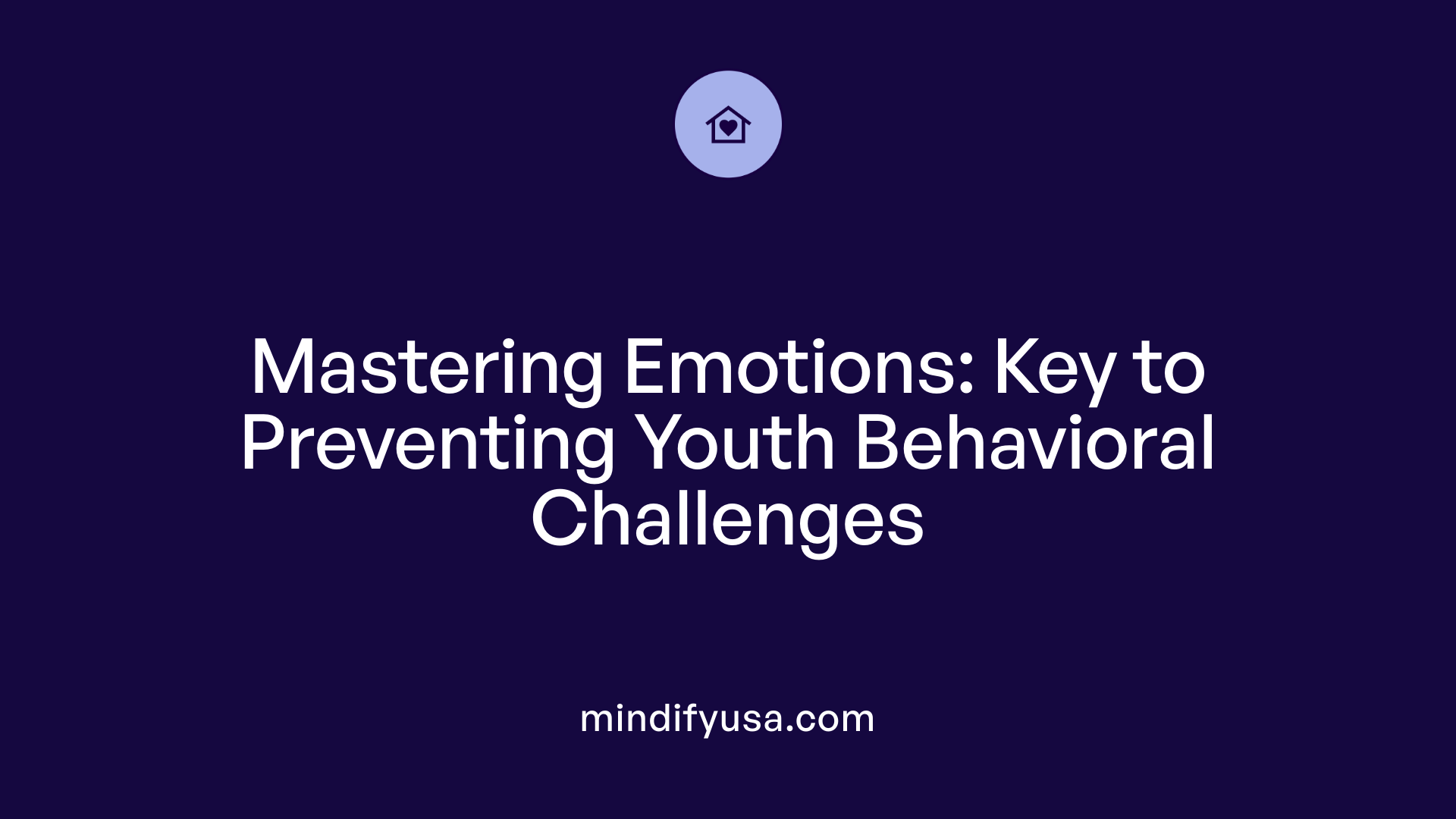
What is the significance of emotional regulation strategies in preventing youth behavioral problems?
Emotion regulation plays a vital role in shaping healthy social and behavioral development in adolescents. Effective strategies enable young people to manage strong emotions, such as anger, fear, or sadness, which otherwise might lead to impulsive actions or conflicts. When adolescents learn to reframe their feelings through techniques like reappraisal or practicing acceptance, they are less likely to engage in risky behaviors or develop mental health issues.
During adolescence, brain development and social experiences influence how emotions are processed and managed. Supportive caregiving environments, including positive socialization practices from parents, teachers, and peers, foster adaptive emotion regulation skills. Conversely, reliance on maladaptive methods like rumination, suppression, or denial can heighten anxiety and depression, increasing the likelihood of disruptive behaviors.
Research shows that teaching young people healthy emotion regulation techniques reduces the incidence of behavioral problems. Schools and community programs increasingly incorporate social-emotional learning (SEL), which teaches coping skills, emotional awareness, and resilience.
Moreover, emotion regulation directly affects social competence. Adolescents who manage their feelings well tend to form better relationships, cooperate more effectively, and experience fewer conflicts. This, in turn, supports their mental health and overall development.
In summary, fostering robust emotion regulation skills during adolescence is essential not only for preventing behavioral issues but also for promoting long-term psychological resilience and positive social interactions.
Early Detection's Role in Managing Youth Behavioral and Emotional Issues
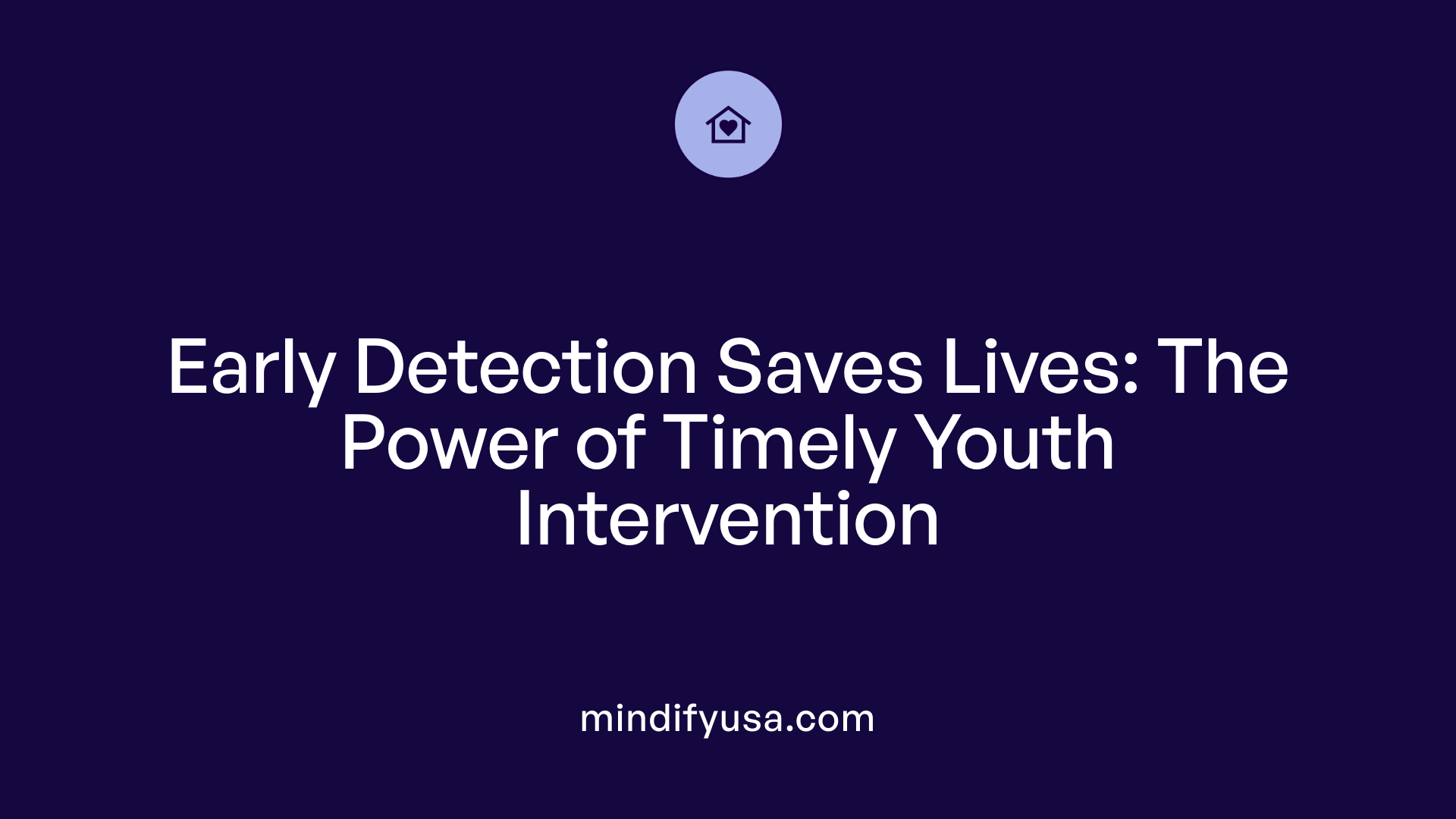
How does early detection aid in managing emotional and behavioral problems in youth?
Identifying mental health concerns early in children and adolescents is vital for effective management. Early detection allows mental health professionals, educators, and caregivers to intervene promptly, reducing the risk of problems escalating into more severe disorders.
Screening methods in various settings, such as schools, healthcare facilities, and community programs, play a significant role. These include behavioral observations, standardized questionnaires, and developmental screenings that assess emotional well-being and social skills.
Timely diagnosis enables tailored interventions that address specific needs. For example, children showing early signs of anxiety or behavioral issues can benefit from evidence-based strategies like parent training, social skills development, or cognitive-behavioral therapy.
Early detection improves long-term outcomes by promoting healthier emotional regulation, better academic performance, and stronger peer relationships. It also minimizes secondary complications like substance misuse, self-harm, or social withdrawal.
Collaborating across services enhances the effectiveness of early intervention. Schools and healthcare providers working together facilitate integrated support—where teachers, counselors, and doctors coordinate screening and referral processes.
Ultimately, early detection creates a proactive approach. It shifts the focus from managing crises to prevention and early support, fostering resilience and well-being into adulthood.
Therapeutic Approaches to Youth Emotional and Behavioral Challenges
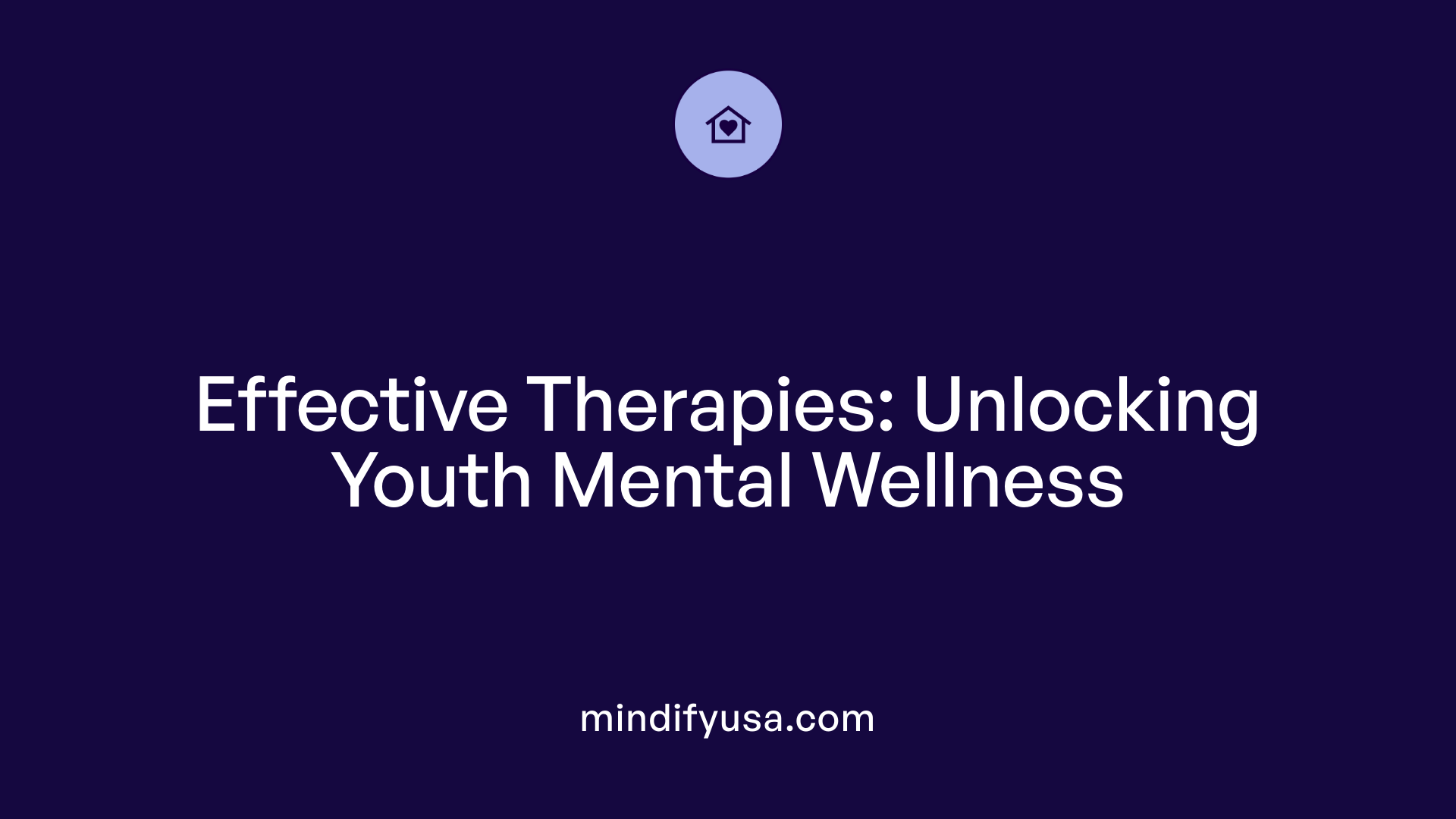
What therapeutic approaches are used to address behavioral and emotional issues in children and adolescents?
Addressing emotional and behavioral concerns in young people requires a variety of evidence-based therapies tailored to their developmental needs.
One prominent approach is cognitive-behavioral therapy (CBT). This therapy helps children and adolescents recognize and modify negative thought patterns and feelings, thereby reducing symptoms of anxiety, depression, and disruptive behaviors. CBT often involves skill-building in emotional regulation, problem-solving, and coping strategies, making it effective across a range of mental health issues.
Applied Behavior Analysis (ABA) is another widely used therapy, especially for children with autism spectrum disorder. ABA employs structured interventions that reinforce positive behaviors and diminish challenging ones through consistent, measurable techniques. Caregiver training is an integral component, empowering families to support this progress at home.
Play therapy and family therapies are also essential tools. Play therapy provides a safe space for young children to express emotions through creative activities, improving emotional understanding and regulation. Family therapy strategies aim to enhance communication, resolve conflicts, and strengthen parent-child relationships, which are critical for children’s mental well-being.
Trauma-focused treatments like Trauma-Focused Cognitive Behavioral Therapy (TF-CBT) and Prolonged Exposure therapy are employed for children who have experienced adverse events. These approaches help them process trauma, reduce post-traumatic stress symptoms, and develop resilience.
Parent training programs, such as Parent-Child Interaction Therapy (PCIT), focus on coaching parents to implement behavior management strategies, reinforcing positive interactions and correcting problematic behaviors. These interventions have shown success in reducing oppositional behaviors and improving family dynamics.
Ultimately, effective treatment plans are individualized, integrating multiple therapies depending on the child's age, severity of symptoms, and specific needs. Incorporating caregivers and family members creates a comprehensive support system, essential for sustainable emotional and behavioral improvement.
Supporting Mental Health and Emotional Well-Being Through Therapeutic Practices
How can therapeutic practices support young people's mental health and emotional well-being?
Therapeutic approaches play a vital role in promoting the emotional health of children and adolescents. Evidence-based treatments such as cognitive-behavioral therapy (CBT), family therapy, and creative therapies like art and music therapy are proven effective.
CBT helps young individuals identify and modify negative thought patterns and behaviors, fostering better emotional regulation and resilience. Family therapy involves parents and caregivers, strengthening relationships and creating a supportive environment that promotes healthy development.
Creative therapies, including art, music, and play therapy, offer children non-verbal ways to express their feelings and develop coping skills. These therapies are especially beneficial for young children or those who face difficulties articulating their emotions.
Early and consistent intervention allows these therapies to be tailored to each child's needs and adjusted as they progress, maximizing benefits. Integrating school programs and digital mental health resources can further support emotional well-being by creating a comprehensive support network.
Involving families and support systems enhances therapy outcomes, encouraging continued practice of coping skills outside clinical settings. Overall, these therapeutic practices build resilience, reduce symptoms of anxiety, depression, and behavioral issues, and promote long-term mental health.
Development of coping skills and emotional regulation
A central goal of therapy is to develop coping strategies that help young people manage stress, regulate their emotions, and build social skills. Techniques like mindfulness, relaxation training, and social skills training are incorporated to help children handle emotional challenges effectively.
Teaching children how to recognize and manage their emotions early on can prevent escalation of mental health issues and support healthy relationships and academic success.
Long-term benefits of early, regular therapy interventions
Engaging in therapy early can lead to significant improvements in emotional and behavioral health, reducing the likelihood of chronic problems later in life. Regular therapy helps children develop adaptive skills, build confidence, and establish healthier habits.
Research indicates that children receiving early interventions show a 50-70% improvement in functioning within the first six months. Moreover, adolescents involved in early counseling are less likely to require crisis services or psychiatric hospitalization in the future.
The importance of involving families and educational systems
Family involvement ensures that therapeutic gains are reinforced outside the clinical setting. Parent training and family therapy equip families with tools to support their child's emotional needs.
Schools also play a crucial role by implementing social-emotional learning (SEL) programs and mental health services, promoting a holistic approach to mental health care for youth.
When families, schools, and clinicians work together, children receive consistent support, which is essential for fostering emotional growth and resilience.
Implementing Effective Early Intervention Strategies for Youth
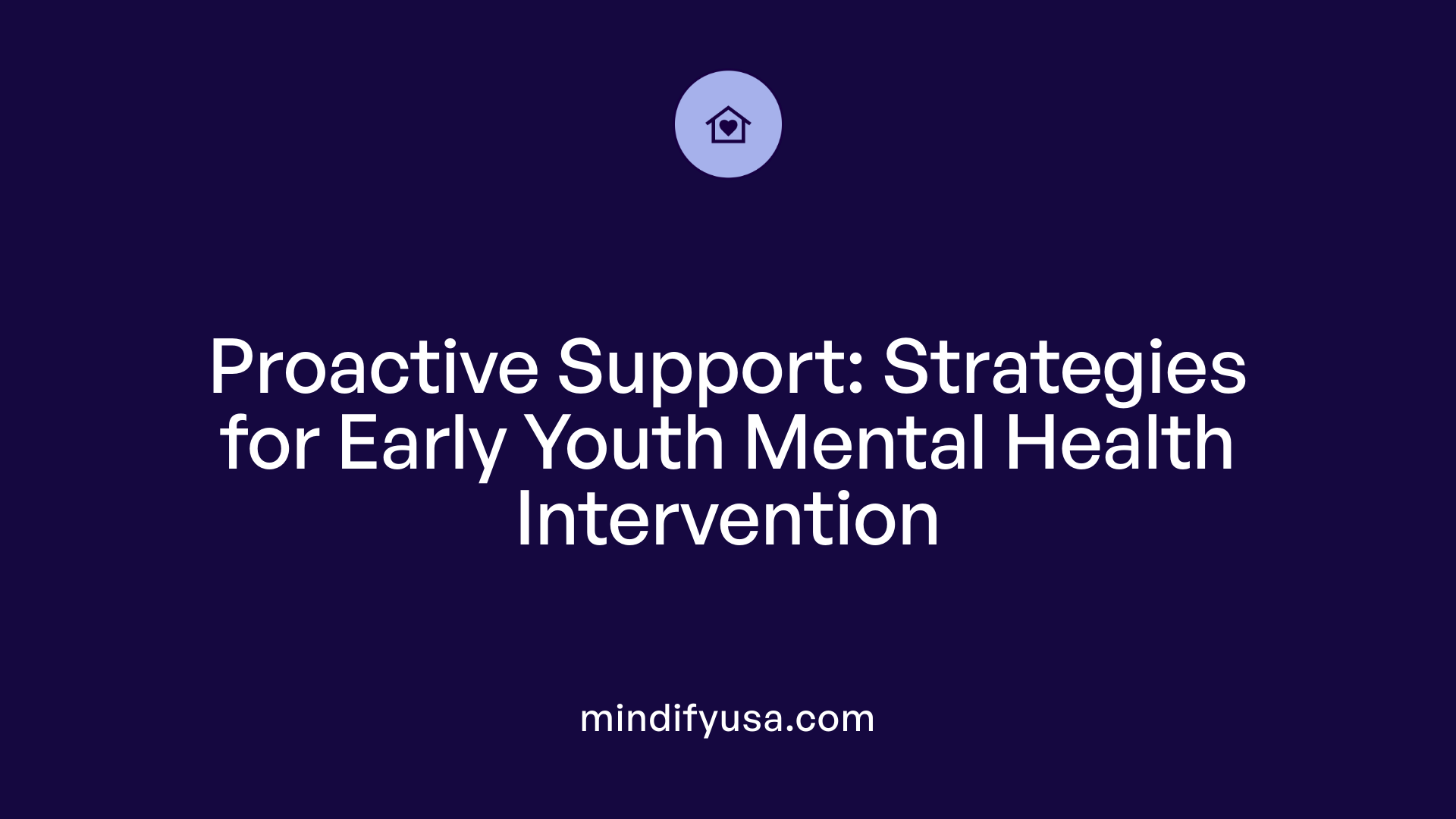
What are effective early intervention strategies for youth mental health and emotional development?
Early intervention strategies for youth mental health are vital in promoting healthy development and preventing long-term psychological issues. One of the most impactful approaches is widespread screening and assessment conducted in schools and healthcare clinics. These screenings help identify emotional, behavioral, or developmental concerns early, allowing for timely support.
Community-based, multidisciplinary models are also essential. For example, Australia’s headspace provides youth-specific, accessible services that integrate mental health support with physical health and social services. These programs aim to eliminate stigma, offer tailored care, and involve a team of professionals—including psychologists, social workers, and educators—to address diverse needs.
Research strongly supports the use of evidence-based therapies such as cognitive-behavioral therapy (CBT), play therapy, and social-emotional learning (SEL). These interventions can be delivered early enough to reduce symptoms and prevent escalation, especially when involving families and caregivers.
Raising awareness and reducing stigma is equally important. Educating young people, families, and professionals about mental health helps normalize seeking help and fosters a supportive environment. Schools and communities should promote mental health literacy through programs and campaigns, encouraging early help-seeking behaviors.
Policy and resource allocation play a crucial role in expanding these initiatives. Investing in workforce development, increasing funding for mental health services, and integrating mental health components within school systems ensure that early intervention strategies are sustainable and widespread.
Combining these approaches creates a proactive system that can detect issues early, deliver timely, evidence-based care, and ultimately foster better emotional and social outcomes for youth.
Resources and Guidelines Supporting Early Intervention Efforts
What resources and guidelines are available to support caregivers, families, and professionals in early intervention?
A wide range of resources and guidelines are accessible to aid early intervention efforts in childhood mental health. Federal programs such as Part C of the Individuals with Disabilities Education Act (IDEA) provide essential services for infants and toddlers experiencing developmental delays or disabilities. These federal resources work alongside state-specific initiatives, like Arizona’s AzEIP and Tennessee’s TEIS, which offer free or low-cost developmental support, therapy, and guidance to families.
Parent and caregiver support services are also integral, including Parent Training and Information Centers (PTIs) and the Help Me Grow hotlines. These organizations deliver multilingual guidance and critical information about accessing and navigating early intervention programs.
Educational resources and training programs enhance the ability of caregivers and professionals to recognize early signs of developmental or behavioral issues. Evidence-based initiatives, such as The Incredible Years® program, aim to improve social-emotional skills and reduce behavioral problems by training parents and teachers.
Proper recognition of early signs involves understanding developmental milestones and behavioral cues. Once identified, effective coordination of services—through multidisciplinary teams—ensures that children receive tailored interventions that address their individual needs.
In summary, federal and state programs, combined with parent-focused support, training resources, and early identification tools, create a comprehensive framework that empowers families and professionals to support young children’s mental health development from the earliest stages.
Research Evidence Supporting the Effectiveness of Early Intervention
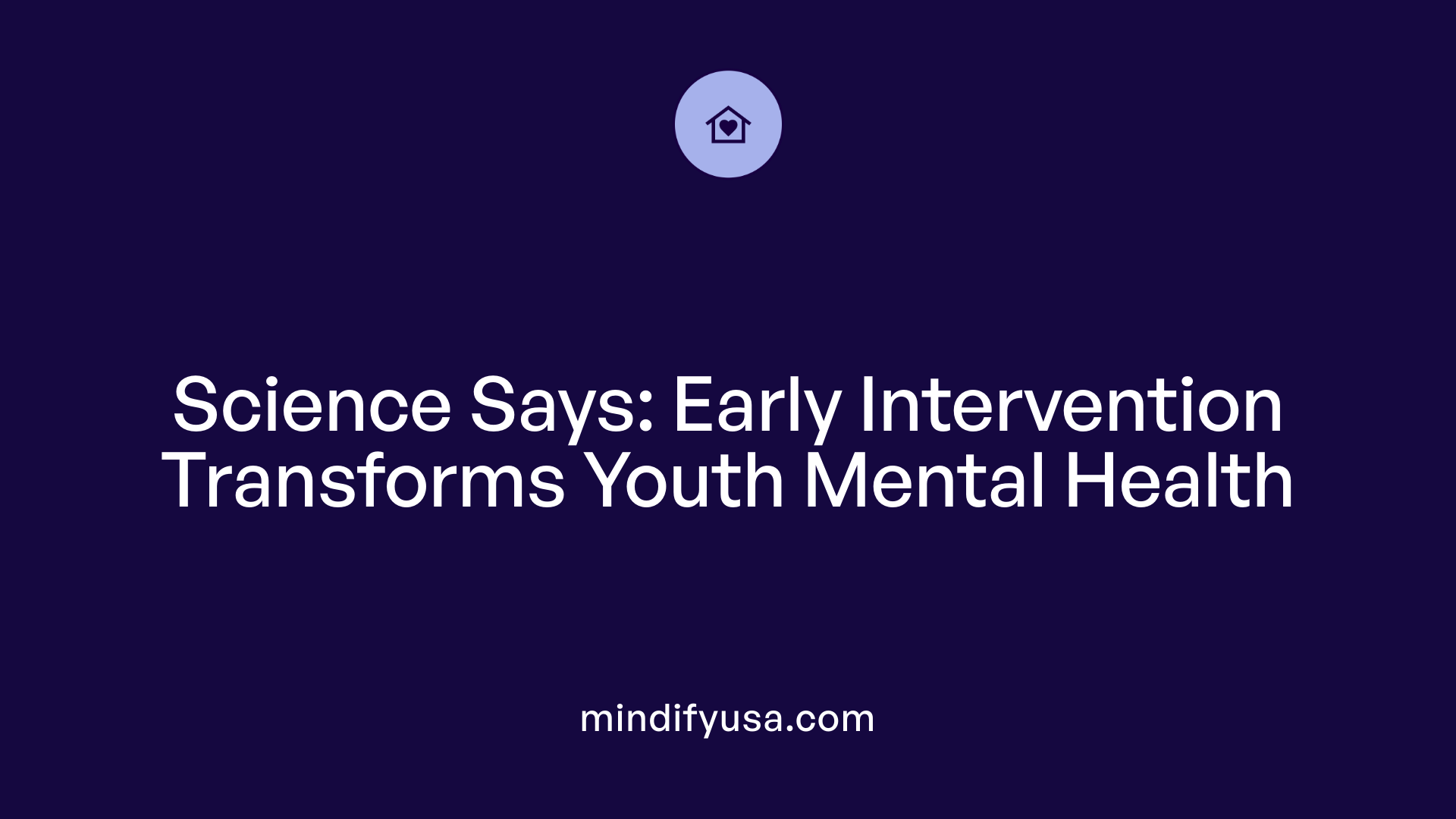
What does research say about the effectiveness of early intervention in youth emotional and behavioral health?
Extensive studies have consistently shown that early intervention is highly beneficial in improving mental health outcomes for young people. When issues such as anxiety, depression, or behavioral disorders are identified and addressed early, children and adolescents experience less severe symptoms, shorter durations of illness, and lower chances of recurrence later in life.
Research indicates that programs implemented during childhood and adolescence — including school-based initiatives, community services, and family-centered approaches — significantly enhance access to care. These interventions help reduce barriers like social stigma and delays in treatment, resulting in higher engagement and satisfaction among youth and their families.
Data from various evaluations demonstrate that early intervention supports resilience and social-emotional development. It ultimately leads to better academic performance, improved social relationships, and healthier emotional regulation. Moreover, individuals who receive timely support tend to face fewer long-term challenges, such as chronic mental illnesses or disability.
The societal benefits are notable. Early treatment reduces the overall burden on mental health services and lowers costs associated with ongoing care and crisis management. Implementing early intervention strategies not only helps individuals but also promotes healthier communities.
Current research continues to explore innovative models and expand understanding of the most effective practices. Future directions include integrating technology, personalized care approaches, and preventative measures aligned with neurodevelopmental insights.
In summary, evidence from multiple studies underscores that early intervention in youth emotional and behavioral health can transform trajectories, fostering lifelong resilience and well-being.
| Study/Dataset | Outcome | Additional Insights |
|---|---|---|
| NIH 2022 | 70% of children improve with early services | Improvements seen within six months, with 50-70% functional gains |
| Journal of Child Psychology, 2021 | 43% reduction in future crisis needs | Adolescents receiving early counseling show lower hospitalization rates |
| American Psychological Association | Disciplinary action decreased by 60% | School-based programs lead to better behavior and attendance |
| General Review | Middle-range effects with CBT and behavioral programs | Emphasizes parent involvement and culturally tailored approaches |
This ongoing research affirms that investing in early mental health support is vital for nurturing healthier, more adaptable generations.
The Promise of Investing in Youth Mental Health Early
Effective early intervention in youth behavior and emotional health, supported by robust evidence and multi-sector collaboration, can significantly alter developmental trajectories. By implementing developmentally appropriate, evidence-based strategies such as social-emotional learning curricula, targeted therapies, and comprehensive screening programs, society can reduce the prevalence of mental health issues, foster resilience, and equip young people with lifelong skills for emotional regulation and social competence. Continued investment in resources, workforce training, and integrated service models is essential to maximize these benefits. The long-term societal gains—improved mental health outcomes, reduced healthcare costs, and healthier communities—make early intervention not just an option but a fundamental responsibility for nurturing the next generation.
References
- Build Resilience: Early Intervention Transforms Child Mental Health
- Interventions for Young Children's Mental Health: A Review of ...
- Supporting Childhood Behavior: Early Strategies for Success
- Early Behavioral Interventions Improve Outcomes in 70% of Children
- An emotion regulation intervention to reduce risk behaviors among ...
- The Power of Early Intervention in Mental Health: A Pathway to ...
- What are the Top Benefits of Early Intervention Therapy for Children
- What is early intervention?
- Why Youth Mental Health Matters: Understanding the Importance of ...
- Addressing Early Childhood Emotional and Behavioral Problems






































































































